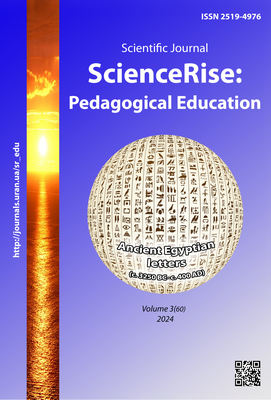Case method in the aspect of forming the values of future lawyers
DOI:
https://doi.org/10.15587/2519-4984.2024.310018Keywords:
case method, formation of values, future lawyers, legal values, professional training, professional competence, respect for the law, inadmissibility of corruptionAbstract
In the context of the ongoing Russian-Ukrainian war, the Ukrainian education sector is facing new challenges, including, in particular, the revision of training for specialists in strategic areas, including lawyers. A developed nationally conscious civil society with strong democratic beliefs and rejection of corruption, which puts the interests of the state at the forefront, is the ideal that today's generation of higher education students should embody. With this in mind, educational practices should be revised, primarily in terms of forming a system of values, as well as maximizing the actualization of learning. We consider the case method to be one of the effective tools that meets these important tasks. The purpose of the study is to comprehend the experience of using the case method with a view to forming the values of future lawyers and is realized through such tasks as studying the educational practices of using the case method, considering examples of the use of the case method in teaching future lawyers, and finding out the impact of the case method on the formation of the values of respect for the law and the inadmissibility of corruption in future lawyers. The examples of case studies, discussed in the article, are devoted to a specific topic – exposing cases of corruption in the higher education system of Ukraine. The author formulates the requirements for the content of cases and the sequence of work with them, which provides for a gradual increase in the degree of independence of students. It is proved that the case method contributes to the formation of such important values for future lawyers as respect for the law and the inadmissibility of corruption. The development of a mature civil society in post-war Ukraine, to which today's students will be involved, depends on the formation of these values. Prospects for further research are seen in the study of the use of the case method to analyze situations related to academic dishonesty
References
- Banakh, V. A., Banakh L. S. (2016). Value orientations transformation of the youth in the conditions of crisis society. Humanitarnyi visnyk ZDIA, 64, 13–21.
- Fedukh, I. S. (2011). Vyznachennia zmistu poniattia «tsinnisna oriientatsiia» u suchasnii psykholoho-pedahohichnii nautsi. Visnyk Natsionalnoi akademii Derzhavnoi prykordonnoi sluzhby Ukrainy, 3. Available at: http://nbuv.gov.ua/UJRN/Vnadps_2011_3_25
- Yan, W. (2023). Research on Case Studies: A Concise Guide on International Law Case Studies. Advances in Applied Sociology, 13 (2), 97–107. https://doi.org/10.4236/aasoci.2023.132006
- Liu, Z. L., Ji, G. M. (2020). Problems and Improvement Strategies of Case Teaching in Law Courses. Vision, 5, 38.
- Ellet, W. (2018). The case study handbook a student’s guide. Harvard Business Review Press Boston, Massachusetts. Available at: http://brandpractitioners.com/wp-content/uploads/2020/06/Harvard-Business-Review-The-Case-Study-Handbook.pdf
- Esponda, P. M., Ezgi, Y., Endres, D., Krisch, N. (2023). The Paths of International Law: Case Studies. The Paths of International Law: Stability and Change in the International Legal Order. https://doi.org/10.2139/ssrn.4430270
- Harrison, H., Birks, M., Franklin, R., Mills, J. (2017). Case study research: foundations and methodological orientations. Forum Qualitative Sozialforschung, 18 (1).
- Mimoso, M. J., Bravo, B. M., Gomes, J. C. (2021). The case study in learning law. International Journal of Innovative Research in Education, 8 (2), 47–53. https://doi.org/10.18844/ijire.v8i2.3247
- Azarov, D. S. (2016). Vchennia pro kryminalno-pravovu kvalifikatsiiu: kilka neochevydnykh funktsii v konteksti vykorystannia metodu «case study». Teoriia kryminalno-pravovoi kvalifikatsii yak fenomen ukrainskoi kryminalno-pravovoi doktryny. Kyiv: Vydavnychyi dim «ArtEk», 11–19. Available at: https://ekmair.ukma.edu.ua/server/api/core/bitstreams/278d7e7a-1ad0-45bc-b773-12805bc31e2c/content
- Kozak, L. V. (2015). Keis-metod u pidhotovtsi maibutnikh vykladachiv do innovatsiinoi profesiinoi diialnosti. Osvitolohichnyi dyskurs, 3 (11), 153–162.
- Pashchenko, T. (2015). Case-method as a modern technology of teaching special disciplines. Molod i rynok, 8, 94–99.
- Pokushalova, L. V. (2011). Metod case-study yak suchasna tekhnolohiia profesiino-oriientovanoho navchannia studentiv. Molodyi vchenyi, 5 (2), 155–157.
- Koicheva, O. S., Yanovska, L. H. (2023). Using the case-study method as an analysis of problem situations in historical education. Innovate Pedagogy, 1 (58), 77–80. https://doi.org/10.32782/2663-6085/2023/58.1.15
- Naumuk, I. (2017). Features of case-study method use in the course of Computer Science teachers' training. Naukovyi visnyk Melitopolskoho derzhavnoho pedahohichnoho universytetu, 2 (19), 132–136.
Downloads
Published
How to Cite
Issue
Section
License
Copyright (c) 2024 Svitlana Soshenko, Viktoriia Prylypko

This work is licensed under a Creative Commons Attribution 4.0 International License.
Our journal abides by the Creative Commons CC BY copyright rights and permissions for open access journals.
Authors, who are published in this journal, agree to the following conditions:
1. The authors reserve the right to authorship of the work and pass the first publication right of this work to the journal under the terms of a Creative Commons CC BY, which allows others to freely distribute the published research with the obligatory reference to the authors of the original work and the first publication of the work in this journal.
2. The authors have the right to conclude separate supplement agreements that relate to non-exclusive work distribution in the form in which it has been published by the journal (for example, to upload the work to the online storage of the journal or publish it as part of a monograph), provided that the reference to the first publication of the work in this journal is included.







